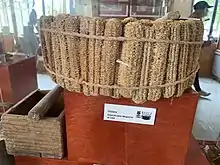olotera
English

An olotera viewed from the side.

The front of an olotera.
Noun
olotera (plural oloteras)
- A traditional Mexican tool consisting of bound, shortened corncobs, against which ears of corn are scraped against to remove their kernels.
- 1960, William Madsen, The Virgin’s Children: Life in an Aztec Village Today, Austin: University of Texas Press:
- Timo sat on a log with the olotera between his legs.
- 1975, Leonardo Manrique C., “34. The Otomi”, in Ethnology (Handbook of Middle American Indians; 7 & 8), Austin: University of Texas Press, page 690:
- The Otomi prefer to do it by scraping the ears against an olotera (fig. 8,c), a bunch of corncobs bound together
- 2015, Nancy Deffebach, María Izquierdo and Frida Kahlo: Challenging Visions in Modern Mexican Art, Austin: University of Texas Press, page 126:
- The woman, who is bent intently upon her work, uses a tool called an olotera to strip the grain from the cob, which she holds between her legs at crotch level, while a large basket is placed between her feet to catch the grain.
Translations
Translations
|
Spanish
Pronunciation
- IPA(key): /oloˈteɾa/ [o.loˈt̪e.ɾa]
- Rhymes: -eɾa
- Syllabification: o‧lo‧te‧ra
This article is issued from Wiktionary. The text is licensed under Creative Commons - Attribution - Sharealike. Additional terms may apply for the media files.